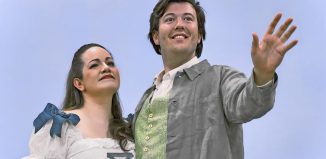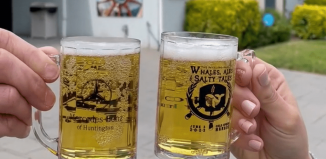PJS Vietnamese Buddhist temple celebrates lunar new year
Laughter and music filled the halls of the Chùa Từ Tâm Buddhist temple along Terryville Road, Port Jefferson Station on Sunday, Jan. 8, during the Lunar New Year celebration.
In a two-week festival, dozens of the Vietnamese and Buddhist communities rang in the new year together. Marking this festive occasion, members of the temple dressed in their finest ceremonial garbs. Many performed traditional songs. Others prepared and served authentic Vietnamese cuisine to those in attendance.
Steven Tang is an executive member at Chùa Từ Tâm, the first Vietnamese Buddhist center on Long Island. He described the Vietnamese New Year as “very similar” to Chinese New Year and other Asian new year traditions, with some select caveats.
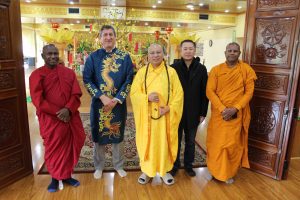 “We celebrate a little bit differently, with more focus on the family gathering,” he said. Tang chronicled the two-year history of the temple. After its acquisition in 2020, he said the temple’s leadership has gradually expanded its activities.
“We celebrate a little bit differently, with more focus on the family gathering,” he said. Tang chronicled the two-year history of the temple. After its acquisition in 2020, he said the temple’s leadership has gradually expanded its activities.
Town of Brookhaven Councilmember Jonathan Kornreich (D-Stony Brook) participated in the celebration. In an interview, he said he has closely followed the development of the temple.
“It’s just a sign of the growing size, strength and health of the Asian community here,” he said.
Reflecting upon American history, Kornreich commented on the need to espouse Vietnamese Americans, many of whom supported the American war effort during the Vietnam War.
“I think that people should know that when you’re a friend of America, that means something to us,” the councilmember said. “When the time came during the Vietnam War, they fought alongside us, and for that I think we owe them a debt of gratitude.”
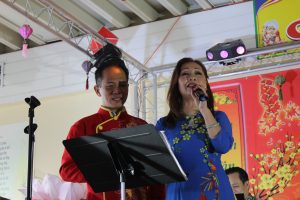 The new year event was not only a way to honor Vietnamese heritage and customs. Several prominent Buddhist clergy members celebrated and supported their Vietnamese peers. This forum served to promote Buddhist teachings.
The new year event was not only a way to honor Vietnamese heritage and customs. Several prominent Buddhist clergy members celebrated and supported their Vietnamese peers. This forum served to promote Buddhist teachings.
Kottawe Nanda, head monk at the Long Island Buddhist Meditation Center in Riverhead, was in attendance for the festivities. He described Buddhism as a global phenomenon that has spread throughout Asia and the rest of the human world. During that time, the teachings of the Buddha were incorporated into various cultural traditions.
“Buddhism mixed with cultures when it spread to the different countries,” Nanda said. Despite regional variations, “everybody accepts and practices the main core of Buddhist teaching,” the head monk said.
Nanda contended that the spread of Buddhist doctrine had accelerated thanks to digital technology. Through social media and other forms of high-speed communication, Buddhist literature has become highly accessible.
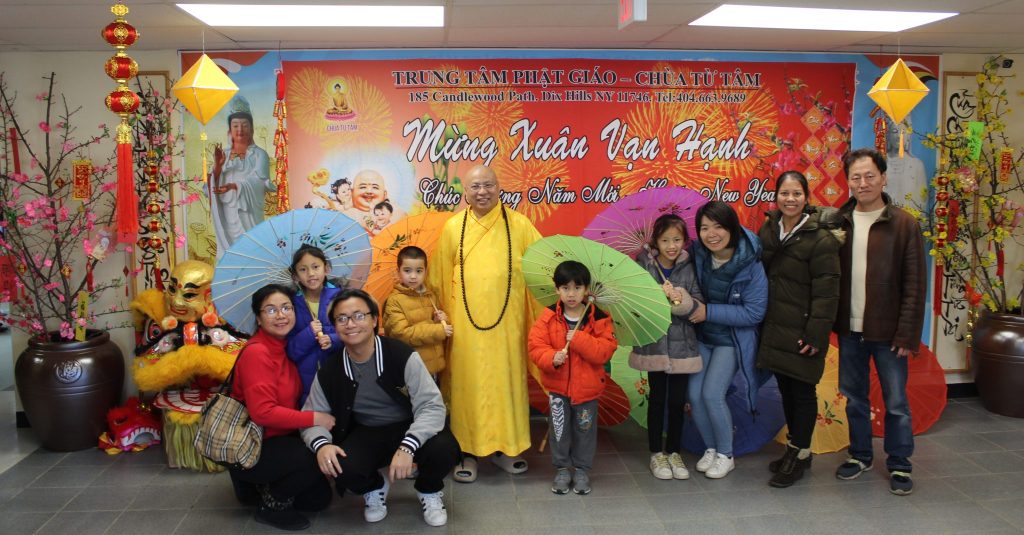 “This technology is so helpful for us,” he said, adding, “We use it for our ‘dharma’ purpose: to teach others and learn from others, to discuss, and for many other things.”
“This technology is so helpful for us,” he said, adding, “We use it for our ‘dharma’ purpose: to teach others and learn from others, to discuss, and for many other things.”
The example of the Buddha is still relevant today, according to Nanda, presenting a way to liberate oneself from suffering and “defilements.” This path, he added, is open to all.
“Anybody who can be dedicated can go through that path — that’s the beauty,” he said. “Even you or I can become Buddhas, can attain enlightenment.”
For Kornreich, the future looks promising for the Vietnamese and Buddhist communities within Brookhaven and Long Island. Viewing the multiplicity of people assembled at the temple, he said this celebration reflects the best aspects of America.
“I think the fact that we’re welcoming of other cultures, that we embrace them as friends and that we recognize the value they bring … I think speaks well of us as Americans and as a community,” he said.
Tang said events such as this aid the temple as it works to grow membership and expand outreach. “We are a very open group of people,” he said. “We always invite new members of different organizations to come to our events to celebrate with us,” adding, “And we will continue to do that.”
Nanda argued that societies must infuse citizens with a shared understanding and common identity to thrive. Regardless of the many ills which plague humanity, he remained optimistic that individuals and societies can satisfy these ends, as reflected by the love and joy spread throughout this event.
“We are all human beings,” the head monk said. “When people have less stress, less anxiety, less sadness, then they are healthy. Healthy people, healthy communities, are good for the government.” He added, “As long as you have a healthy mind, your body has good health.”
— Photos by Raymond Janis


